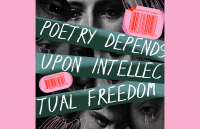
Writing a Romance versus Writing a Mystery
crimereads.com – Wednesday August 17, 2022

Is there that big a difference between falling in love and solving a murder?
Um, yes, there is, especially when writing about love and murder. For me, it’s not just about content but about the craft and process of writing in those separate genres. I find it fascinating that although I’ve been writing for over twenty years, my beginning process for writing cozy mysteries is vastly different than it is for writing in the romance genre.
I started writing romances because I love to read them. It’s not a billion dollar industry for nothing! Comprised of formulaic and original plots, as well as a guaranteed happily ever after (HEA,) the genre breeds voracious readers who want engaging lead characters, a romantic main plot, and that all-important HEA (or HFN—happily for now, which has become accepted in the genre.)

Unwritten — The crisis in creative writing
honisoit.com – Monday August 15, 2022

When she sat down to craft her debut novel in 2020’s lockdown, months after finishing her undergraduate degree, Diana Reid had never considered a career in writing before. An incisive debut about the interplay of sexuality, feminism, and power at an Australian university campus, Love and Virtue (2021) surfaced to overflowing critical acclaim and was named Book of the Year by the Australian publishing industry in June.
But, in hindsight, it very well might not have been written.
“It kind of terrifies me, actually,” Reid says. “I was so dependent on this very freak circumstance [lockdown] before I actually sat down and opened a blank word document.”

Writers and Liars: On Fact, Fiction, and Truth
lithub.com – Sunday August 14, 2022

I’ve often heard authors say that fiction is merely lies. George R. R. Martin has said that “we’re writing about people who never existed and events that never happened…[a]ll those things are essentially untrue.” Norman Spinrad characterizes these fictional lies as differentiating the genre from “biography, history, or reportage.” The list of writers with this viewpoint goes on and on. There’s even a fiction writing group, for whom I once had the pleasure of being a guest speaker, called the Pocono Liars Club.
It’s not hard to understand this perspective. As a novelist, I do make things up for a living. But I believe the job of the author is to tell emotional truths, and that the best way to do that is rarely by relaying facts and figures or repeating events just as they happened. Journalism and documentaries have an important place and often use the same toolbox as fiction does, however, fiction is uniquely suited to truth-telling because humans have storytelling baked into our DNA. We understand the world best through stories, and these are an incredible way to arrive at something approaching a universal truth.

Why We Need Independent Publishers
newsletters.theatlantic.com – Tuesday August 9, 2022

Along with most everyone I know who works in or otherwise relies on book publishing for their livelihood, I’ve been following the Biden administration’s antitrust case against the proposed Penguin Random House/Simon & Schuster merger. Last week, as John H. Maher of Publishers Weekly live-tweeted us through the opening days of the trial, my timeline was filled with [skull-emoji] quote-tweets of things that many of us aren’t used to hearing folks in publishing say out loud. PRH lawyers have argued that “after the merger, the market dynamic will be just the same,” while the DOJ maintains that combining two of the “Big Five” publishers into one would decrease the number of offers an author might receive, lower book advances, and make it harder for writers to support themselves. In a pretrial brief, the DOJ stated that if the merger goes forward, it “would … give the merged company control of nearly half of the market to acquire anticipated top-selling books from authors”—a point underlined by Stephen “My name is Stephen King, I’m a freelance writer” King when he took the stand last Tuesday. “Consolidation is bad for competition,” he said.

8 Steps to Follow When Writing an Early Death Scene
nofilmschool.com – Tuesday August 9, 2022

Do you want a supporting character's death to be impactful? Then follow these steps!
The fourth season of Netflix's Stranger Things introduced many new characters that we quickly learned to love or despise. While many side characters feel like archetypes rather than fully formed characters, one stands above the rest because of how impactful her story and death were.
Although Chrissy Cunningham’s (Grace Van Dien) story is incredibly short, lasting only a single episode, her impact on the main characters and viewers was undeniable. In five scenes, the audience empathized with Chrissy’s trauma and hardships and even swooned over her blossoming friendship with Eddie (Joseph Quinn), all to watch her die a horrific death.
How did the writers maximize Chrissy’s story to get such a high emotional payoff with her death scene? Schnee breaks down what to focus on when writing an early death scene that has a lingering effect on the rest of the main story, and how you can approach an early death in your next project.

The Art of Accidentally Writing a Thriller
crimereads.com – Tuesday August 9, 2022

Let me start by admitting something that may be a little shameful, a little anathema, on a site like this: I’m not a crime fiction aficionado. Honestly, I read other genres much more extensively. I’ve never read Agatha Christie (gasp!), Lee Child, Gillian Flynn, Harlan Coben, Dean Koontz, James Patterson, John Grisham etc. Sadly, the list goes on. Are you still reading? Am I still invited to this club? Maybe, maybe not.
Let me also say, I fully enjoy the thriller/crime/mystery genre. I love Tana French, Kate Atkinson, and Val McDermid; I especially enjoy thrillers that toe the line between other genres like Julie Phillips’ Disappearing Earth or Jeff Vandermeer’s Annihilation. But I don’t read fiction to watch car chases, solve clues, or guess who dunnit. The truth is, I often don’t really care. Oh man, I AM gonna get kicked out of this club! Let me explain.

Why I Chose Travel Writing As My Retirement Career
travelawaits.com – Monday August 8, 2022

I love to work, explore new possibilities, get out of my comfort zone, live a full and exciting life, and hang out with my husband. I chose travel writing as my retirement career so I could enjoy all those things and live a good life.

Dollars, Cents, and Being Left With the Bill: Jillian Medoff on Breaking Up With Her Literary Agent
lithub.com – Saturday August 6, 2022

In 2008, after 13 years together, my literary agent and I parted ways. (To preserve her anonymity, let’s call her Michael Ovitz.) Between 1995 and 2002, Michael Ovitz sold two of my novels, including my debut, Hunger Point. By any measure, our partnership was a terrific success. Michael Ovitz and I were more than just agent-writer, we were mentor-protégé, friends, confidantes. She invited me to stay in her country home. I corresponded with her daughter. She met my parents. We bought each other gifts. “You’re a part of the family,” she liked to say.
Business isn’t emotional, but people are. This is especially true in the highly subjective book industry, where an author’s imagination, manifested on the page, is the product. Michael Ovitz is an attorney, and the smartest, savviest woman I’d ever met, like Ari Gold from Entourage, but with a maternal affect. Near the end of our first conversation, she asked if I had any questions. I was so wowed I could barely speak. “Who else do you represent?” I blurted out. “Can I see a client list?” (This was before agents posted their client rosters on websites, but Michael Ovitz was way-old-school, anyway. She wouldn’t accept electronic submissions, corresponded only by hand on heavy cardstock, and didn’t adopt email until well into the aughts.) “Oh, Jillian,” she said, chuckling at my farm-girl faux pas. “That’s simply not done. Those names are confidential.”

Writing Insights: Why don't agents tell you why they rejected your book?
authorlink.com – Monday August 1, 2022

Many writers ask why agents don’t give more specific reasons for rejecting a book submission. A standard answer is: “not the right fit,” though a submission is in the same genre they represent.
There can be a number of reasons why a literary agent rejects a work. When an agent says a work is not the right fit for them, it may or may not relate to the writing itself.
The agent could have more submissions than they can handle at the time, or they have just sold a similar title, or they know an editor is looking for a particular story angle, and your submission doesn’t fill that story angle. It could be that the agent doesn’t see the work slotting into a particular category they represent. There are different kinds of thrillers, for example. Maybe the agent knows they can sell psychological suspense but doesn’t know where to go to sell a medical thriller. Maybe the agent doesn’t feel the story targets a large-enough audience or the market is glutted with similar titles. It can also mean the agent simply doesn’t have time to thoroughly read your story, but a quick read tells them it doesn’t fit a need. Or, maybe they are tired and just had a bad day. Agents are human, you know. So, don’t take it personally.

5 Creative Cures for Writer's Block
psychcentral.com – Saturday July 30, 2022

It’s stressful when the words don’t come, when you’re sitting at your desk staring at the blinking cursor or the barren page. Minutes feel like hours. Hours feel like days.
Deadlines loom, and you’re still stuck and staring. A kind of dread begins building in your stomach and travels to your throat, and then peaks between your temples. It’s reminiscent of firecrackers exploding.
“Writer’s block, or any creative block, is really about fear,” according to Miranda Hersey, a writer, editor and creativity coach. The fear of not knowing where to start or we’re headed. The fear that we’re not good enough.
Blocks are tough. They can feel big and intimidating and impossible. But where there’s a block, there’s also a way out. Here are five ways to break through writer’s block.
Get the free newsletter | Submit a news item or article | Get Writers' News for your website





